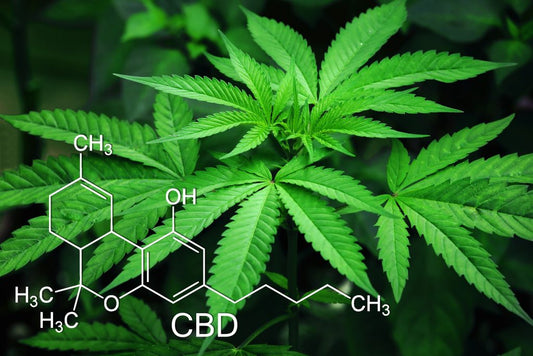Written by: Andrew Roberts
Reviewed by: Dr. Matthew Scott, PhD & DHSc
Date: 07/21/2010
Full Spectrum vs Broad Spectrum vs Isolate.
Understanding terms is important when recognizing the cannabinoid ingredients inside your CBD products.
Due to the entourage effect, Full Spectrum CBD has and will always be the most effective type of CBD product.
The Different CBD Spectrums
To understand CBD products, you need to know the three CBD spectrums:
-Full spectrum: Contains all the naturally occurring compounds, Phytocannabinoids, and terpenes. Is the least processed. Allows for the best entourage effect and results. Appears as a medium to light golden honey.
-Broad spectrum: Same as full spectrum except another process is used to remove the trace amount of thc. Broad Spectrum products typically appear lighter similar to clear honey.
-Isolate: Cannabinoid oil is processed that removes everything from the plant except for a single cannabinoid, typically cbd. Isolate usually appears as a white powder.
Each differs in its extraction refining processes, they also behave differently within your endocannabinoid system. Knowing about each type allows you the knowledge needed to make an educated decision on what product is best. We will briefly go over these extraction processes used to create these different spectrums.
CBD Oils Contain More than Just CBD
CBD oil doesn’t necessarily contain just CBD and oil. Cannabis contains over 100 different phytocannabinoids, terpenes, and other essential fats and oil. CBD or THC typically being the most prominent, these two cannabinoids are also the most well-recognized and known cannabinoids in the scientific and medical community. Just because CBD & THC are the most prominent and known, doesn’t mean the other cannabinoids should be forgotten, in fact they are of great importance.
When buying a CBD product, most products will identify whether it’s full spectrum, broad spectrum, or isolate which tells you if the product has legal, trace amounts of THC, or lack thereof. This will also identify whether there are other cannabinoids in the formula.
Each spectrum identifies the various other components that work alongside CBD, enhancing the entourage effects and effectiveness. Whether CBD is a full spectrum, broad spectrum, or isolate depends on how it's processed after its first extracted from raw Cannabis.
Knowing this information is critical when deciding on a full spectrum, broad spectrum, or isolate cbd product. Allowing you to decide which one is best for you and your loved ones, for daily use.
CBD Wellness Extraction Process
When raw hemp goes through the extraction process, cannabinoids, flavonoids, and terpenes are stripped from the plant material. However, the cannabinoid profile of CBD oil will differ based on the cannabis used during the extraction process. No 2 plants are the same, so it’s vital we have our Scientist who’s well versed in botanical formulations to properly navigate creating a consistent product, especially with the varying levels of cannabinoids from every extraction.
CO2 extraction- Used first to separate the plant material from cannabinoids, flavonoids, terpenes, and fatty acids. This will yield a full spectrum oil.
Distillation- Used after CO2 to further separate the compounds and oils, which yields a higher percentage of cannabinoids. This is achieved through a series of heating and pressure methods.
What Is Full Spectrum CBD?
Full spectrum CBD means that it uses all of the phytocannabinoids found in Cannabis; this includes CBD along with terpenes, essential oils, and other cannabinoids.
Because the THC content in our full spectrum CBD oil is legal (0.3% or less), you won’t feel any intoxicating or high effects from this trace amount of THC.
CBD Wellness’s Full spectrum CBD allows consumers to fully benefit from the “entourage effect” which works hand in hand with our “endocannabinoid system”. This effect requires the combination of whole-plant cannabinoids and terpenes, it is quite different from broad spectrum or isolates only.
What Is the Entourage Effect?
The active CBD-Rich cannabinoid compounds found in cannabis (and in all our full spectrum CBD products) work together to enhance their effectiveness and benefits. These compounds and cannabinoids work synergically, creating what is called the entourage effect.
The entourage effect refers to cannabis components working together to boost or intensify the benefits of CBD. Other than CBD, full spectrum extracts will contain additional cannabinoids, including:
Cannabinol (CBN) – cannabinoid made from oxidized THC. The longer raw cannabis matures, the more CBN it will create from THC. Known for its relaxing and sedative qualities.
Cannabigerol (CBG) – non-intoxicating cannabinoid produced from cannabigerolic acid during decarboxylation.
Cannabidivarin (CBDV) – minor cannabinoid with a molecular structure similar to CBD.
Cannabidiol acid (CBDA) – 2-carboxylic acid form of CBD, an essential compound found in cannabis.
Cannabichromene (CBC) – cannabinoid useful for a variety of beneficial effects.
Tetrahydrocannabinol (THC) – most known cannabinoid, in high concentrations it is responsible for getting users “high”. Legal, trace amounts (0.3% or less) found in all phytocannabinoid CBD-Rich hemp plants. Legal, trace amount of 0.3% thc found in CBD products cannot get you high or cause any intoxicating effects. Essential for the entourage effect and endocannabinoid system.
The added terpenes and cannabinoids in full spectrum cbd positively affect the cannabinoid receptors in your endocannabinoid system – either by blocking or allowing cannabinoid molecules to bind and communicate with the connectors and receptors. Full spectrum CBD provides a better overall response, this is because of its ability to utilize all of the compounds from the entire cannabis plant rather than just CBD alone or CBD lacking certain other main cannabinoids and terpenes.
What Is CBD Isolate?
CBD isolate means “pure CBD”: it contains no other cannabinoids, terpenes, or flavonoids. Even though pure CBD uses only cannabidiol isolate, its extraction requires a great deal of additional processing.
“Pure” used to describe cannabis products typically can mean several different things.
Pure CBD is just that, an isolated compound of 99.9% that contains nothing else.
Pure CBD oil is CBD oil that has not been altered or anything added to it.
Pure CBD Extracts, same as CBD oil, meaning it has not been altered or anything added to it.
As previously mentioned, the extraction process of raw cannabis separates the plant material from the compounds cannabis hemp is comprised of, this includes its terpenes and flavonoids. The steps are similar (carbon dioxide extraction, steam distillation, solvent extraction, lipid extraction), only more processing must be done to isolate CBD to a single compound.
CBD isolates are the most concentrated form of CBD. Isolate is or should be 98 - 99 percent CBD. That being said, more concentrated CBD doesn’t mean it’s better or has more beneficial attributes. Due to CBD isolate products containing only the isolated compound, it is recommended to use minimally (1) other Isolate product (CBC, CBG, CBN) in order to receive more extensive benefits to create the entourage effect.
What Is Broad Spectrum CBD?
Similar to full spectrum, broad spectrum cbd oil uses CBD (cannabidiol) with most of the other compounds found in cannabis except thc. The thc is removed through another extraction process after the oil is processed.
Broad spectrum contains some of the different cannabinoids and terpenes (in smaller amounts than full spectrum). Because broad spectrum does contain some cannabinoids and terpenes, it helps minimally generate the entourage effect without THC, just not as well as full spectrum.
Broad spectrum CBD shares similarities with full spectrum, it has one primary difference that separates the two. Full spectrum contains trace amounts of THC (0.3% or less), while broad spectrum contains no THC after it’s been removed.
Full Spectrum vs. Broad Spectrum – Which Is Better?
Full spectrum is the best option when it comes to effective CBD for your health and wellness. However, Board Spectrum is still a great option especially for those that can not have THC.
Full spectrum utilizes whole-plant extracts containing CBD with terpenes, essential oils, and most importantly, other cannabinoids. Because full spectrum includes cannabis compounds other than CBD, it creates the “entourage effect.” Full spectrum being the best option to benefit the most from the entourage effect and CBD.
While broad spectrum utilizes the plants extracts which contains CBD, some cannabinoids (thc removed or negligible), and a smaller amount of terpenes. Broad spectrum products do create an entourage effect, just not as well compared to full spectrum CBD.
Again, the main difference between the two is the THC content: full spectrum CBD oil contains legal trace amounts of THC (0.3% or less), and broad spectrum CBD oil has none. THC included with full spectrum CBD oils (>.3%) isn’t enough for consumers to become intoxicated or induce a high.
Why Should I Use Full Spectrum CBD Oil?
It is the better option for using CBD and allows you to benefit the most from cannabis. This is why it’s known to help improve health and wellness, allowing you to live your best life. Most people prefer the legal trace amount of .3% THC in their CBD products.
Pros:
Full spectrum CBD oil creates the entourage effects, making it the best spectrum for effectiveness.
Trace legal amounts of .3% THC – most users prefer.
Delivers greatest overall benefits and effects, superior to broad spectrum CBD & CBD isolates.
Nontoxic, will not cause intoxication or a “high”.
Can be euphoric.
Cons:
Can be more regulated in some states.
THC (although not marijuana, some users have concerns with the legal trace amount of .3%)
Why Should I Use Broad Spectrum CBD?
Like CBD isolate, broad spectrum has no risk of any psychoactive effects, similar to full spectrum CBD, and still offers benefits from the entourage effect.
It’s most useful for people who might be concerned or sensitive to THC. Typically has zero thc, however some contain negligible amounts of thc.
Pros:
Broad spectrum CBD is nontoxic, will not cause intoxication or a “high”.
Offers some benefits of the entourage effect.
Greater benefits than CBD isolates.
Cons:
Doesn’t allow thee full benefits or effects of the entourage effect compared to full spectrum.
Not as effective when compared to full spectrum.




